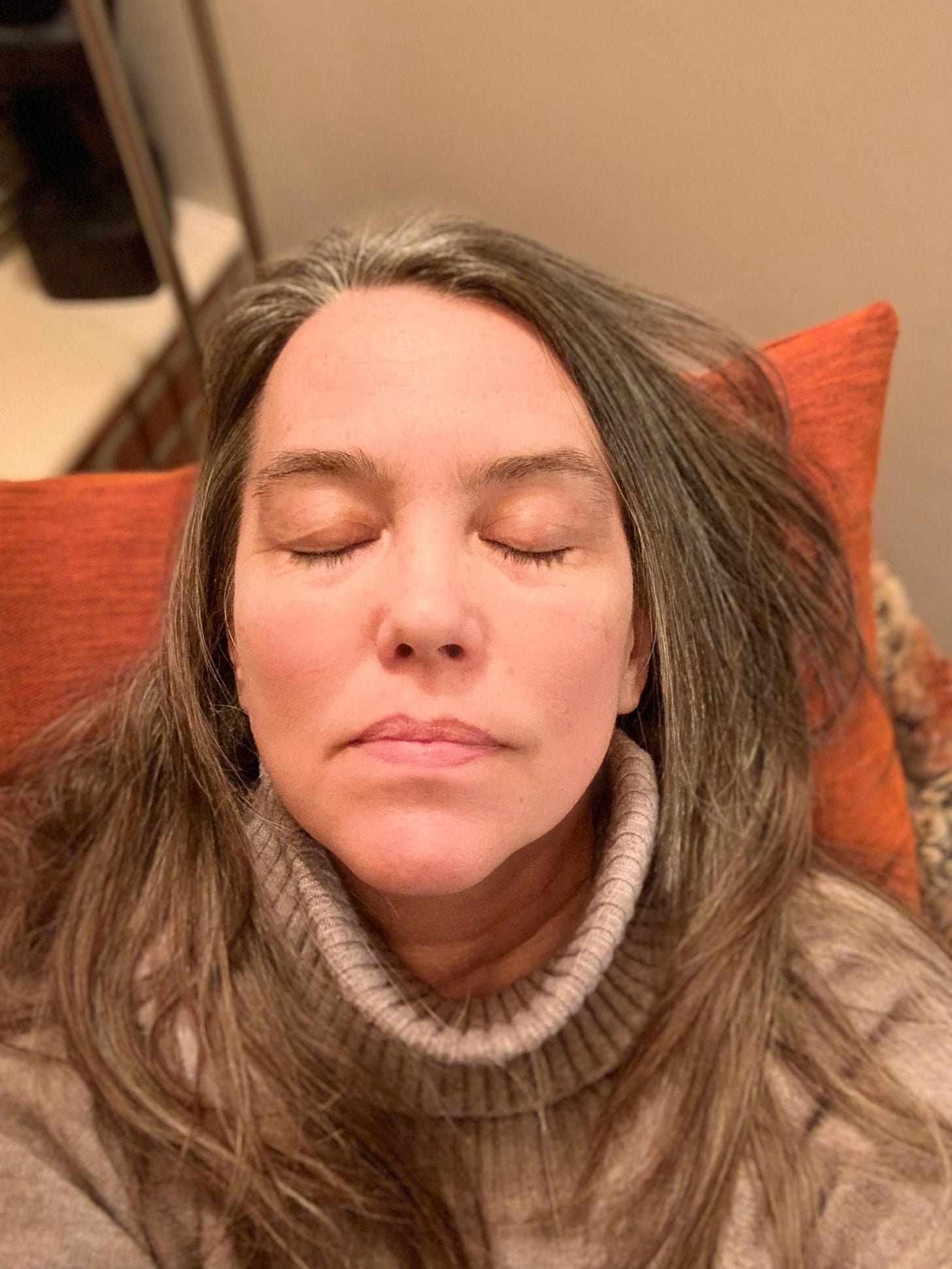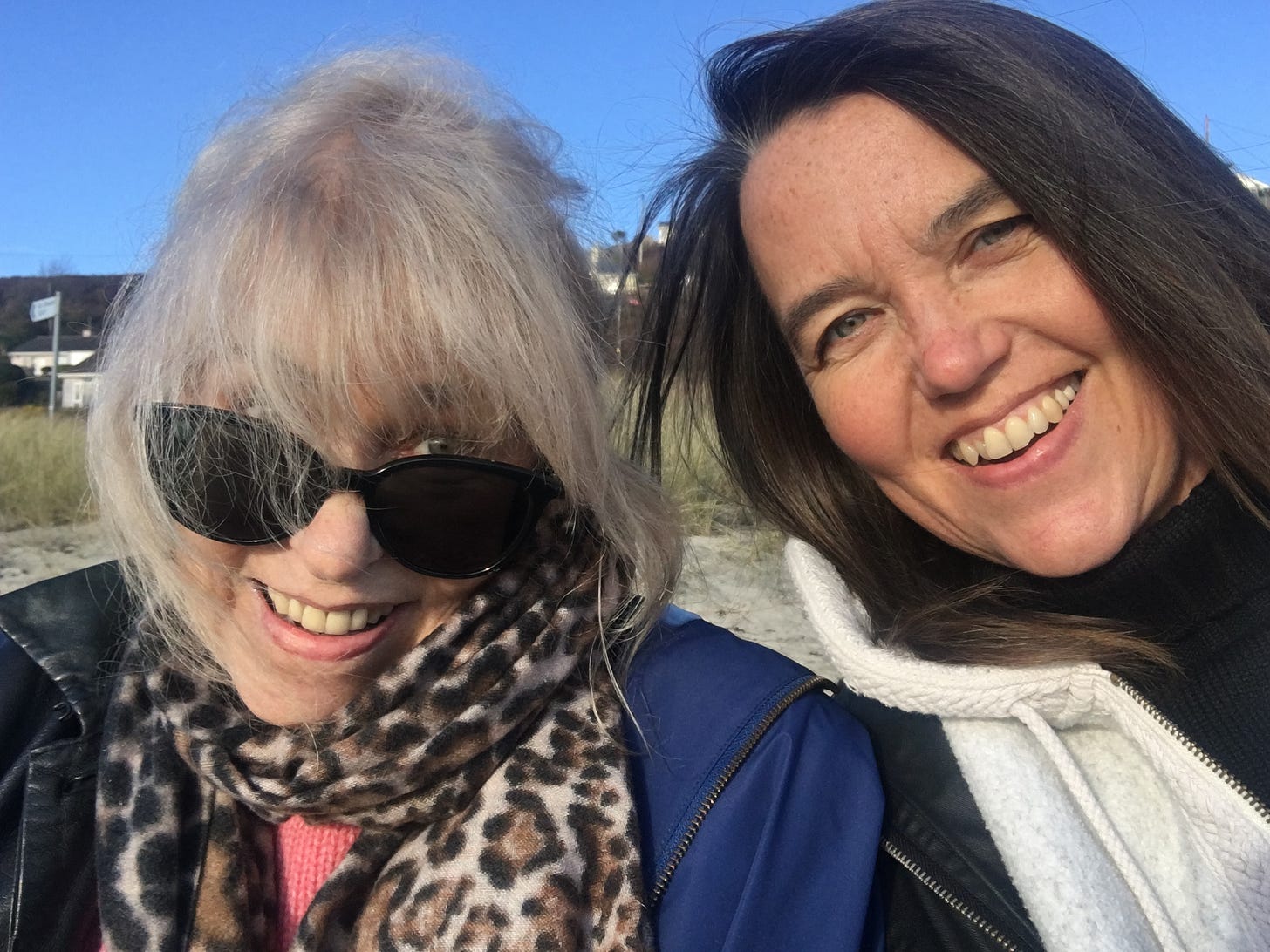Slipsliding away
Mothers, daughters and dementia.
Just a few weeks ago I visited the UK to spend some time with my mother who, at the distressingly young age of seventy-six, is already in a nursing home with dementia. One afternoon, back in the house she was once so proud of, the edges of it visibly fraying without her frantic attentiveness, I collapsed on the sofa and took this photo. Being with her that day had been like trying to fly blindfold through an emotional twister, tossed hither and thither by her distress, spite and tenderness, all directed by the tenacious life force occupying the fragile bag of kindling her body has become. The irony that she’s now thinner than even when on one of her strictest diet regimes, and yet she doesn’t realise it, is not lost on me.
However, the part of her that has never stopped considering my body to be an extension of hers, and thus to be monitored at all times, is still alive and kicking and, as I lean over her to help her adjust her position, she prods the flesh that rolls over the top of my jeans with a sharp finger. ‘What’s that?!’ she says with a mixture of disgust and triumph and I smile and say as neutrally as I can, ‘Oh, it’s just my menopausal middle.’ I bite back my desire to remind her how her own weight has gone up and down dramatically over the years, changes which I never commented on except to reassure her that she looked great. However, she has never returned the favour, regarding my body in its slenderness or plumpness, its youthfulness or its ageing as some kind of competition or comment on hers.
As I get older, I see her face looking back at me from the mirror more and more often. She has always seemed a tiny plucky bird next to my above-average height with her deep-set eyes, severe cheekbones and beaky nose; compared to the broad plain of my face, saucer-like eyes and button nose we hardly seemed related. But as I move closer to my sixties and my eyelids hang heavier, my once full cheeks now retreating like glaciers to reveal the substrata, the similarity is obvious. I have her feet too, their geisha-like delicacy something she used to obsess over whilst berating my ‘plates of meat’. It wasn’t until I had a foot-appreciating lover and saw them through his eyes that I realised they were just like hers, only two sizes larger.
Thanks to dementia, on one of her good days, when the demons of anxiety that have chased her relentlessly all her life take the day off, I have seen glimpses of the mother she could have been, and the mother that I hope I would have been had I been able to have children: sensitive, nurturing, tender, intuitive. It has been hard to meet those qualities in my mother now, knowing that they lurked in there all along. As they emerged, the child in me internally wailed, ‘But it’s too late for this now! I needed this when I was a baby; when I was a little girl!’ In meeting those parts of her for the first time I was newly bereft.
The few people in my life who know even half the sob story of my childhood find it hard to understand why I still have anything to do with my mother. And indeed, in one breathtaking moment of clarity recently she said to me, ‘Why are you here? Why are you being so nice to me? I did everything I possibly could to make you hate me?’ My answer: because you are my mother, and I don’t have another. Attachment is strong stuff, yes, but it’s also as if her every cruelty showed me who I didn’t want to be; in some ways, I am her negative imprint; we are forever entwined.
Do I forgive her unforgivable actions? It’s been a long time since I asked myself that, but it seems that I now do. Through my years of training as a psychotherapist, I saw her first through the eyes first of pathology and since then, gradually through the eyes of compassion. She did a lousy job of mothering, few would deny that, and it seems somewhere inside her she knows it too. But she still managed to do better by me than she had experienced herself.
And in truth, can I be so sure that I would have managed any better than her as a poorly-educated, unwed, Catholic, working-class teenager, abandoned by the father of her child and with nowhere to go but back to her ice-hearted mother? Can I really be so sure that I’m a bigger or better person…
It’s a low bar, I’ll give you that, but it leaves a big enough gap to let me love her. Usually safely and from a distance because, like all forces of nature, it’s never wise to let your guard down around it.
Now, thanks to her dementia, when the conditions are favourable, it’s safer to approach her. Sometimes she lets me hold her hand or stroke her back, or just sit next to her on the bed and gather her under my arms like a child, letting her find the comfort in me she could rarely bear to offer. There is a sort of healing there, for both of us, and who am I to say she doesn’t understand it just as I do? Words and time have lost their edges for her, but it’s softened the walls between us.
I don’t know how long this will last - we don’t live in the same country and so it’s usually at least a few months between my visits and her decline is not predictable. People ask me, ‘Does she still know who you are?’ and I realise that this is what most of us who haven’t experienced dementia first-hand know about it.
But the truth is, in those precious moments when she softens into my embrace, or we amuse each other with our shared quirkiness, I realise that perhaps she knows me better now than she ever did. And maybe ever will again.




Phew! Jody you’ve done it again. Written an emotive, on point piece that resonates so darned sharp I can feel the blade. Me and my mother - right there. Amazing. Thank you 🙏 I feel for you, I really do. Sending love Trish x
Thank you for this essay, Jody. These words of yours, "the part of her that has never stopped considering my body to be an extension of hers, and thus to be monitored at all times" jumped out at me, and your essay hooked me. With a 92 year old mother with dementia who is only 18 years older than me, I finally have a reprieve from her "owning" me, now there are no more critiques, just grateful acceptance. She always wanted to live vicariously through me, because her own life was so awful, and so now, ironically, she owns me, because I must take care of her. As an only surviving child of this woman who wanted several and lost 2 stillborns after me, there is no escaping my singularity in her life. She has no more extended family. As a survivor of the Holocaust she is a first-person witness who is part of a dwindling group. Her memories are now mine, even though I come by them too late, and there are no more details to be gleaned from her broken mind. Like you, I feel resentment has morphed into deep compassion. I also connect with your words about being "safer to approach her" due to the dementia. My mother became schizophrenic when I reached adulthood, and her illness made me wish I could disappear form her life -- I wanted her gone, she was that emotionally destructive. Dementia has redefined how I feel about her.